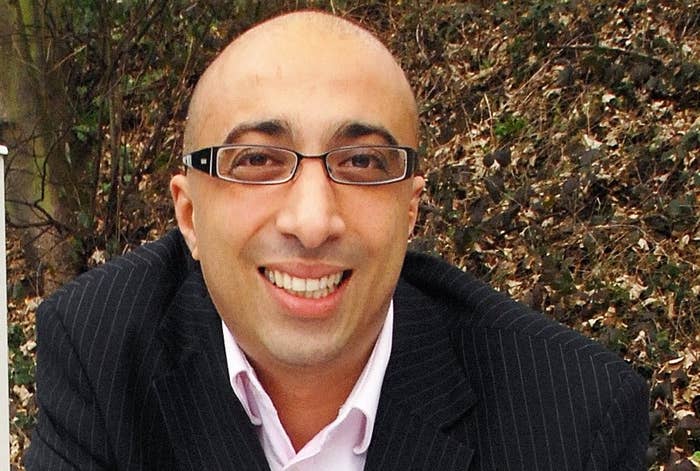
A scientist who moved to the UK over 25 years ago has been refused permanent residency by the Home Office.
Bruno Pollet, a French national who came to the UK in 1991 as a student on the Erasmus university exchange scheme, told BuzzFeed News he now intends to leave to take up a position as professor of renewable energy at a university in Scandinavia, taking his British wife and their 2-year-old son with him.
“It's really disappointing,” he said. “So we decided that it's time to move on, and to be in control of our destiny.”
Pollet currently works as chief technology officer at a Swansea-based environmental technology company and also as a visiting professor at Ulster University. He’s spent the last 25 years in the UK, apart from the three years between 2012 and 2015, when he worked in South Africa.
It’s due to the fact he spent these three years in South Africa that the Home Office says he’s disqualified from getting permanent residency in the UK.
It’s possible to apply for a permanent residency card after having lived in the UK for five years (or a shorter period of time, depending on your circumstances), but if after those five years you are absent for more than two, you lose your right to do so.
Pollet says that although he wasn’t employed in the UK for those three years, he was still paying taxes and his mortgage here.
He has been given a chance to appeal the decision, but has decided against it: “It's shameful to be a bargaining chip really, to be seen by this government as a second-class citizen. To live here, after that? I'd rather take my skills away and live somewhere else where I'll be appreciated.”
EU academics in the UK such as Pollet don't know what their fate will be post-Brexit, which has led scientists to warn of a Brexit “brain drain”. In October BuzzFeed News spoke to three scientists who’d decided to leave the UK after the vote.
The latest figures show that over 30,000 academic staff at universities in the UK are EU nationals, making up 16% of the total.
Pollet says he doesn’t regret the decision to go to South Africa, and he explained in his application to the Home Office for permanent residency that he felt the job he took there was “paramount” to his career development. Early-career scientists typically have to move jobs, and often countries, every few years to advance and, in some cases, to remain in academia at all.
He says he also included his full CV with a list of his publications in the application. “I’m sure they didn’t care, but in my mind I thought they might consider it,” he said.
After the EU referendum on June 23 he and his wife initially thought everything would be fine because of her British citizenship, but they decided he should apply for permanent residency to be on the safe side.
The letter Pollet received from the Home Office acknowledged that as a European national, he was not required to leave the UK once his application had been refused. But he says he doesn’t want his family to remain in limbo while the government figures out what Brexit will mean for EU nationals in the UK.
“It's not fair on my wife,” he says. “She's British, so why do we have to move away from the UK for us as a family to have the right to live somewhere?”
He also voiced his concerns about the anti-immigrant sentiment he said he’d seen before and after the Brexit vote: “It's not all about me, it's also about my son – I don't want him to be bullied in school because his dad is French.”
Though Pollet says he’s made up his mind about leaving, he thinks the UK government should guarantee rights for EU nationals married to British citizens. “This is not only affecting the EU national but also the British partner,” he said. “It tells you that actually the government doesn't really give a monkey's about their own citizens.”
Andrew Steele, chair of campaign group Science is Vital, told BuzzFeed News: “This is a huge issue for scientists generally, as we're a very internationally mobile group. Not only does this mean cases like Bruno’'s could well be very common, but it also means it's easy for us to up sticks and leave, whether it's for reasons of residency like this, or just because Europeans working in the UK don't feel welcome.
He added: “The government needs to act fast and give reassurances if we're going to avoid a brain drain of some of our top researchers, working on everything from medical research to developing clean energy technology.”
“I think they should put something in place, some special cases like scientists and engineers,” said Pollet. “You guys have got the best universities, you have to attract the best, and I think the Home Office tactics at the moment are absolutely wrong.
“Without blowing my own trumpet, a lot of countries are now mopping up all the good scientists. It's good news for other countries and bad news for the UK.”
A spokesperson for the Home Office said: “European citizens resident in the UK make a vital contribution both to our economy and our society. That's why we will be making securing their status, as well as that of British nationals in the EU, a priority as soon as we trigger Article 50 and the negotiations begin.
“EEA nationals are not required to apply to the Home Office for documentation confirming their status or their right to be here and these rights remain unchanged while we are a member of the European Union.”
